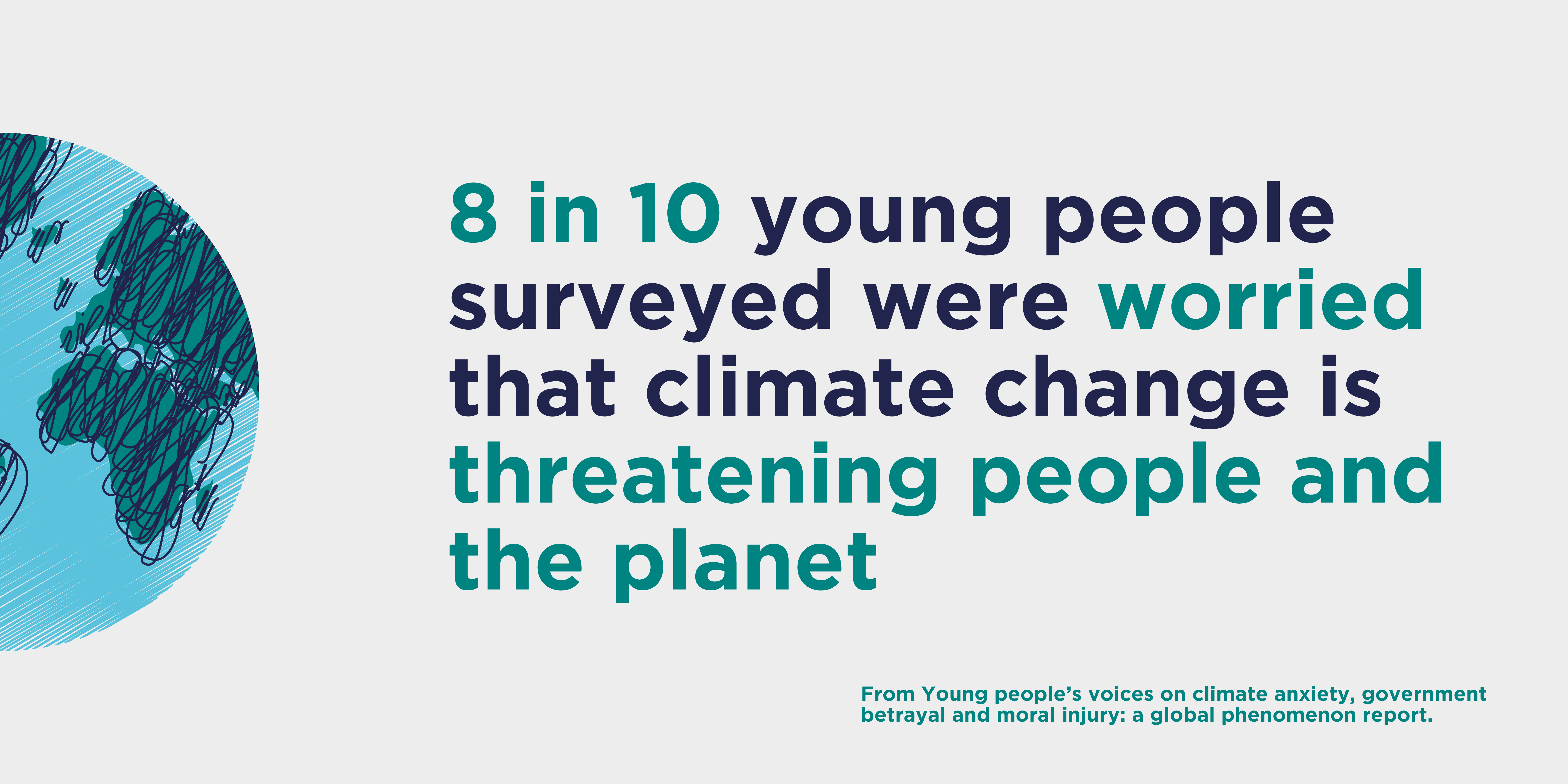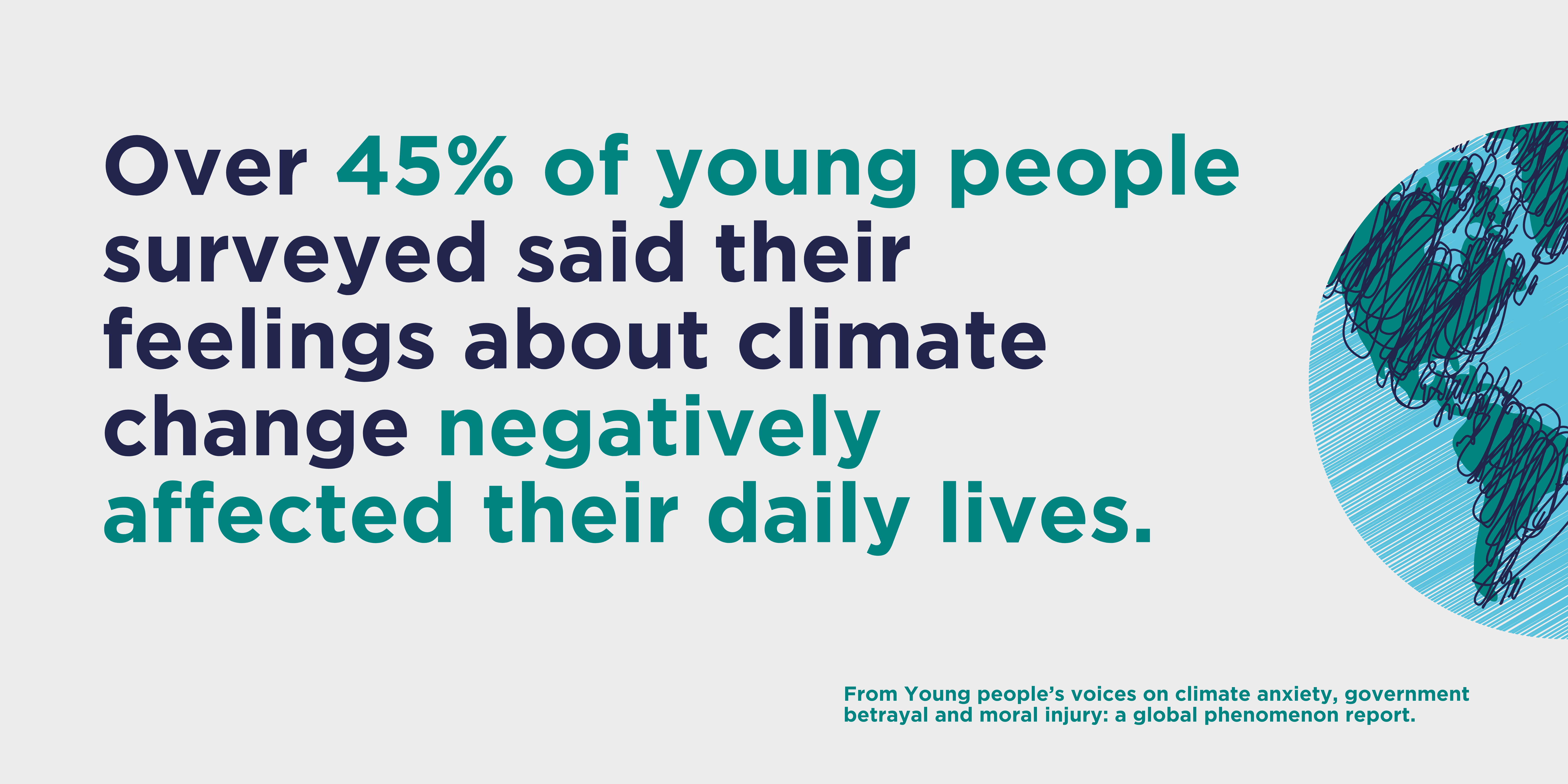Eco-anxiety is a worry relating to the environmental crisis. Find out more about what it is, how to recognise it and what you can do if you’re experiencing it.
What is eco-anxiety?
There are varying definitions of eco-anxiety, also known as climate anxiety, which is a relatively new term. Put simply, it is worry relating to the environmental crisis. It can involve feelings of worry, fear, anger, grief, despair, guilt, powerlessness and shame.
People will experience eco-anxiety differently, it might depend on how you experience the impacts of climate change, which could be through direct experience (for example, flooding, droughts or other extreme weather) or through consuming news or media coverage about the climate crisis, or through working in a job where you see the impacts of climate change day to day.
Research has found that many young people believe that governments are failing them because of inaction and that young people feel betrayed and abandoned, which can lead to distress and eco-anxiety.
Some researchers don’t view climate anxiety as a mental health illness but instead as a normal response to the existential threat to the planet. However, climate anxiety can impact people’s mental health.
Is it really real?
Yes. There is no doubt that anxiety related to the climate crisis, climate change and the environment is real. There is still lots of ongoing research into eco-anxiety, but a range of professionals and experts have spoken on the topic.
Research released in September 2021, surveyed 10,000 young people from across the world on eco-anxiety, some of these results can be seen below.


Do you have eco-anxiety?
There’s still lots of research happening about eco-anxiety, but experts say these are some things to look out for:
- Does thinking about the climate crisis keep you up at night?
- Does it impact your ability to concentrate on work or studies?
- Do you get upset when you think about the climate crisis?
- Do you feel hopeless about the future?
If you answered yes to some or all of these, it might be time to think about some steps to help you look after yourself, see below.
What can you do?
Acknowledging your emotions is important and might help you to motivate yourself to create some positive actions.
Climate Activism
First thing’s first, you can’t solve this issue by yourself and it’s important to acknowledge that.
Talk about climate change and the environment with your friends, family and community. Find out what climate activism groups are in your local area and see whether you want to join one. You might want to take a look at the following organisations to start with:
- Friday’s for Future Scotland
- 2050 Climate Group
- Young Friends of the Earth Scotland
- Extinction Rebellion Scotland
- Climate Camp Scotland
You could also take a look at what events, opportunities and activities you can take part in with like-minded people. Take a look at our COP26 page for a list of different things that are happening in October and November 2021.
Listen to Mikaela Loach and Jo Becker discuss how they got into climate activism in their podcast Yikes, below.
Individual Actions
Taking some individual actions and control over your lifestyle might help you to feel like you are more in control and feel empowered.
You can make decisions on things like what you eat, how you travel and what you buy with the environment in your mind. For example, you might want to consider less or no meat or dairy in your diet, buying second-hand clothes or using public transport rather than driving or getting a taxi. Take a look at some steps Sam and Bianca (from the BBC’s My Eco-Anxiety & Me podcast) have made:
“My main thing that helps me is changing my diet, that was a massive thing for me and that has a knock-on effect environmentally and that’s something that helps me know I’m doing my best.” – Sam
“It really is amazing how empowered you feel when you start trying and making small changes. For example, bringing a water bottle, just keeping a tote bag in your backpack or bag. Just choose one item that will be mostly effortless and start there. And I guarantee that the feeling of empowerment you will have from that tiny change will give you the strength to do bigger changes as well.” – Bianca
If you’re considering making changes to the amount of meat in your diet take a look at our page called Keep Your Plants On. you might also want to take a look at our sustainable Scottish diets information and eating in season.
If you’re thinking about making changes to your lifestyle, it may feel overwhelming. Take small steps, set goals and make a plan. And make sure you celebrate your successes too.
Listen to Mikaela Loach and Jo Becker discuss individual change and system change in the podcast episode below. In the first episode shared above, you can also hear Mikaela and Jo discuss some of the individual actions and lifestyle changes they made.
Looking After Yourself
You need to make sure you’re looking after yourself and practising self-care as well. Being an activist can be time-consuming and lead to burnout.
Burnout is a result of stress happening over a long period of time that is emotionally demanding.
Some signs of burnout can be feeling guilty for taking time off, feeling hopeless, an imbalance between the things you enjoy and your activism, thinking negatively more often and reduced energy. You may also have physical signs such as headaches, tiredness to muscle tension.
It’s really important to know your limits, learn what you need and take breaks when you need them. You might want to take a look at our mindfulness activities, breathing exercises or the #AyeFeel page for some ideas.
You can also speak to a range of organisations if you’re feeling anxious, worried or stressed, take a look at #AyeFeel’s list of organisations who you can speak to via phone, text, online chat, emails or forums.
More information
For more information on this topic, take a look at the links below which is where the information in this article has come from:
- WATCH – How youth climate anxiety is linked to government inaction
- WATCH – What is Climate Anxiety?
- LISTEN – Me & My Eco Anxiety on BBC Sounds
- READ – Young People’s Voices on Climate Anxiety, Government Betrayal and Moral Injury: A Global Phenomenon research
- READ – ‘Eco-anxiety’: how to spot it and what to do about it
- READ – Dealing with Climate Burnout
You might also find Young Scot’s #AyeFeel page about mental health and emotional wellbeing useful.
